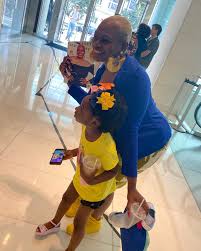
Rare Community Profiles is a Patient Worthy article series of long-form interviews featuring various stakeholders in the rare disease community, such as patients, their families, advocates, scientists, and more.
‘Cancer Could NEVA’ Break Her Spirit: How Kecia J. Survived and Thrived Through Her Rare Colorectal Cancer Battle
Throughout our lives, we will meet people whose stories transcend the ordinary, whose narratives are richer from overcoming adversity and coming out stronger. Kecia J. is one of these people. Her story is a testament to the resilience and purpose she has embodied for decades, even amidst harsh challenges.
As a former celebrity talent manager, Kecia J. effortlessly commanded the spotlight. Her energy and light were, and remain, infectious; she has long been a beacon of joy and positivity for those around her. But her resolve was tested when she was diagnosed with HIV in 2006. Rather than letting her diagnosis define her, Kecia J. embarked on a journey of advocacy and awareness. She shares:
“People kept telling me, ‘Well you don’t look like you have HIV. You don’t look like you have AIDS.’ Well, there are people in this world who aren’t celebrities, who aren’t world-renowned, who have HIV and have to navigate this taboo and this stigma on their own. I’m speaking as a woman with AIDS who isn’t Magic Johnson. In society’s mind, this means that you’re dead or that you’re going to die. To me, becoming an advocate presented an opportunity to educate others and to dispel these myths.”
But her path once again took an unexpected turn when, in August 2020, Kecia J. was diagnosed with a rare form of colorectal cancer. The prognosis was not promising—and the failed treatments were agonizing. Yet Kecia J. remained resilient. She navigated her diagnosis by leading with hope. Even on the darkest days, Kecia J. clung to her belief that “cancer could NEVA” extinguish her spirit.
Today, with No Evidence of Disease (NED), Kecia J. has turned her pain into purpose. As an advocate and the author of Cancer Could NEVA: A Motivational Guide to Overcoming Trauma & Illness, Kecia J. provides a roadmap for those on their own journeys through adversity. In Kecia J.’s story, we find not only inspiration but a reminder that even in our darkest moments, we can not only survive, but thrive.
The Path to Diagnosis
In 2020, Kecia J. felt healthier than ever. She was the mother to a healthy baby girl, hiked three days a week at Runyon Canyon, and enjoyed her fresh smoothies. Essentially, she says:
“I was doing everything that someone with undetectable AIDS should do to remain healthy.”
Then one day, she woke up with a nagging irritation below the waist that soon gave way to severe pain. At first, Kecia J. attempted to pursue care at the emergency room. She kept getting shooed away; it was the height of the COVID-19 pandemic and the hospitals were overloaded. But the pain would not subside. As it worsened, Kecia J. continued trying to find care and kept being turned away. She explains:
“One doctor told me I had hemorrhoids. Another told me that maybe it was delayed pain from giving birth. I visited seven emergency rooms in three states because I knew something was going on. Doctors gave me ibuprofen, opioids, or creams but nobody believed what I was saying. My pain was completely discounted. In some ways, I think it had to do with the ‘strong Black woman’ trope—and the fact that Black women are often discounted by doctors. As an advocate now, I hear often from other women of color who have had the same experiences.”
One morning, Kecia J. woke up in excruciating pain. She ended up at the emergency room begging for help. This time, doctors listened. Kecia J. was given intensive pain medication and scheduled to see a colorectal surgeon a few days later. She says:
“By the time I went in for a rectal exam, I was told that I had cancer. I had a tumor the size of a tennis ball and had to start treatment right away. They breezed through the diagnosis—in fact, I learned the type of cancer I have when I went to MD Anderson for my survivorship—and threw the treatment information at me incredibly quickly. A few days later, I had to sign a form that said treatment would rid me of my female parts. Now that I’m on the outside and an advocate, it’s frustrating to think about. I wasn’t even told my options.”
About Colorectal Cancer
Kecia J. had stage 3B colorectal cancer. Her cancer first began as anal cancer, a rare cancer that occurs in the anal canal, before metastasizing to the colon. She shares:
“Anal cancer is one of the rare cancers that occur in people with compromised immune systems. Even though I had worked to be healthy and undetectable, I still have a compromised immune system. I think people sometimes forget that, even if you take meds and take care of yourself, this can still happen.”
Doctors don’t know the exact cause of anal or colorectal cancer, but they have identified risk factors. These include being Black, being older than 50 years old, having certain inflammatory intestinal conditions, smoking or alcohol use, and diabetes. However, it is possible to develop these cancers even when risk factors are mostly absent.
People with colorectal cancer may experience symptoms like fatigue and weakness, rectal bleeding or bloody stool, a persistent change in bowel habits, a feeling that bowels don’t empty completely, pain, or unintended weight loss.
Treatment differs based on cancer stage and overall health. In early stages, treatment options include laparoscopic surgery, polypectomies, and endoscopic mucosal resection. Later, minimally invasive surgery, partial colectomies, or lymph node removal are options. In advanced stages such as Kecia J.’s cancer, doctors may use chemotherapy, targeted therapy, immunotherapy, and radiation as treatments.
Kecia J. was treated with chemotherapy and radiation; while the chemotherapy was tough, the radiation was one of the most difficult challenges she has ever faced. Initially, doctors assigned her with six weeks of radiation. She had to stop after four weeks because she developed severe 2nd-degree burns across her body. Kecia J. shares:
“Treatment changed my life. I don’t know if anybody knows what it means to be burned to the magnitude I was burned. I spent two weeks in the burn unit watching flesh fall off my body. The nurses outside, I could hear them whispering that they didn’t want to come into the room to help me. I would break down crying with excruciating pain that not even opiates could solve. I had a bowel obstruction. I felt embarrassed and like less of a woman. Treatment took me on a mental, physical, and spiritual rollercoaster.”
Remaining Resilient
On the fourth floor of the hospital, in a small and scrunched-up room, Kecia J. sat with her thoughts. She was in debilitating pain and on a rotation of drugs—morphine, fentanyl, oxycodone, oxycontin—that seemed to barely help. Doctors told her that her spinal cord would never recover from radiation. Her palliative care team tried to keep her comfortable but Kecia J. felt like she was losing her mind. She shares:
“I told the head of my team that I couldn’t do it anymore. I felt like I was a drug dispensary and I was still in my pain, like my body was becoming immune. In those moments, I could only think of my daughter. She doesn’t deserve to be without a mom. My daughter was only 1.5 years old. What kept me mentally pushing through was knowing that I couldn’t leave her.”

Unsure of what to do next or where to turn, Kecia J. asked God to help her. She held her iPad in her hands and thought about all the things in her life that cancer was trying to take from her. Shaking from the pain, she wrote:
“Cancer could never…stop me from being a good mom. Stop me from being a good partner. Stop me from showing up.”
Every day, Kecia J. would write. The catharsis was freeing. With the mental and emotional outlet, Kecia J. found herself growing stronger. She was released from the hospital on Thanksgiving 2020. By Christmas, she was standing up on her own, baking cookies with her daughter.
Despite separating from her partner and learning to manage the trauma of her treatments and diagnosis, Kecia J.’s story flowed out of her, bit by bit, chapter by chapter. Cancer Could NEVA now stands as a reminder that nothing can stop you from being your best self.
About a year and a half ago, Kecia J. was told that she now has No Evidence of Disease (NED). She remains cancer-free.

Addressing Stigma and Mental Health
As both an HIV/AIDS advocate and colorectal cancer survivor, Kecia J. has dealt with her fair share of stigmatization. HIV/AIDS and colorectal cancer tend to be considered “taboo.” It can be embarrassing to discuss these topics. But failing to talk about them is only perpetuating further harm. Says Kecia J.:
“The stigma is not doing anything but hurting you. It isn’t hurting me. I already know what’s going on with me. People ask me how I have a healthy child, and I want to share that you can be a parent with HIV/AIDS and be just as great of a parent. Having cancer was worse for me than having AIDS, but many people still struggle with speaking about cancer. Sharing our story can be embarrassing for some people. Getting a colonoscopy can be embarrassing. Nobody wants a colonoscopy. But would you rather be embarrassed or watch people die? I also believe that the stigma comes, in part, from cultural issues. People of color don’t always want to talk about health stuff, from HIV to lupus. We’d rather talk about it when it happens. The stigma prevents people from living a healthy life.”
Kecia J. works to dispel the stigma by leading through action. When sharing her story, she talks about the good days and the bad days to highlight the spread of possible outcomes. More importantly, she focuses on showing people that you can still have a life with HIV/AIDS or with cancer, that your life isn’t over. She explains:
“Our focus on medication is counterproductive. We have to show people through action by showing life outside of medication. When I consult with organizations like the American Cancer Society, my goal is to show them how to communicate and advocate to effectively break stigmas. We know cancer is horrible—but what else? Show people living life, being in love, traveling. ”
Increasing Support
Through her mission to break the stigma and open more honest, informative conversations, Kecia J. also urges physicians and patients to focus on the importance of mental health. Cancer and treatments can be incredibly physically, mentally, and emotionally demanding. Yet mental health support isn’t always prioritized—even after the main battle with cancer is over.Says Kecia J.:
“Cancer is something I will live with mentally for the rest of my life, but there’s a lack of resources available to help with coping. The moment you’re told that you’re NED is just like, ‘Okay, go into the world now!’ For some people, that isn’t possible because you need to mentally build yourself back up. I went from possibly dying and having to get my affairs in order to just getting pushed back into the world, having to walk again, having to show up as a friend, mom, and wife again. Everyone says, ‘Be thankful. God is good’ which he is, but mentally I’m not. Nobody tells you how to deal with the trauma; you just have to stand on faith. Helping people cope with life after is not included enough in survivorship. Now I am mentally healing. When life strikes you down with a rare condition and it spreads, it forces you to deal with things you never thought you’d deal with. My therapist is helping me heal and now I’m living. I’m learning to take it a day at a time.”
Kecia J. realizes that this isn’t always easy for everybody. That there are still the lingering “what if’s” – what if something is wrong? What if I relapse? What if…? But she reminds people that the best way to tackle the what-if’s and to get past the trauma is to live in the now:
“Be thankful for right now. You’re going to go crazy if you only think about the future. Every day is a different day. Have a healthy mind. Make healthy decisions. Pursue checkups. Do what makes you happy. For me, that means living until I can’t live anymore. I’m going to travel with my daughter. She’s autistic and I want to show her that life exists outside of your diagnosis. I want to prove that you can live and mentally heal and push past everything. And for anybody who is waiting for their time to share your story, to get to this point, I know that it takes time. But eventually you will share your story and you will heal, and that’s what will break the stigma.”
Editor’s Note: Host Colby Rogers recently interviewed Kecia J. on Patient Worthy’s podcast, “Wait, How Do You Spell That?” To listen to her interview and other inspiring patient stories, click here.







